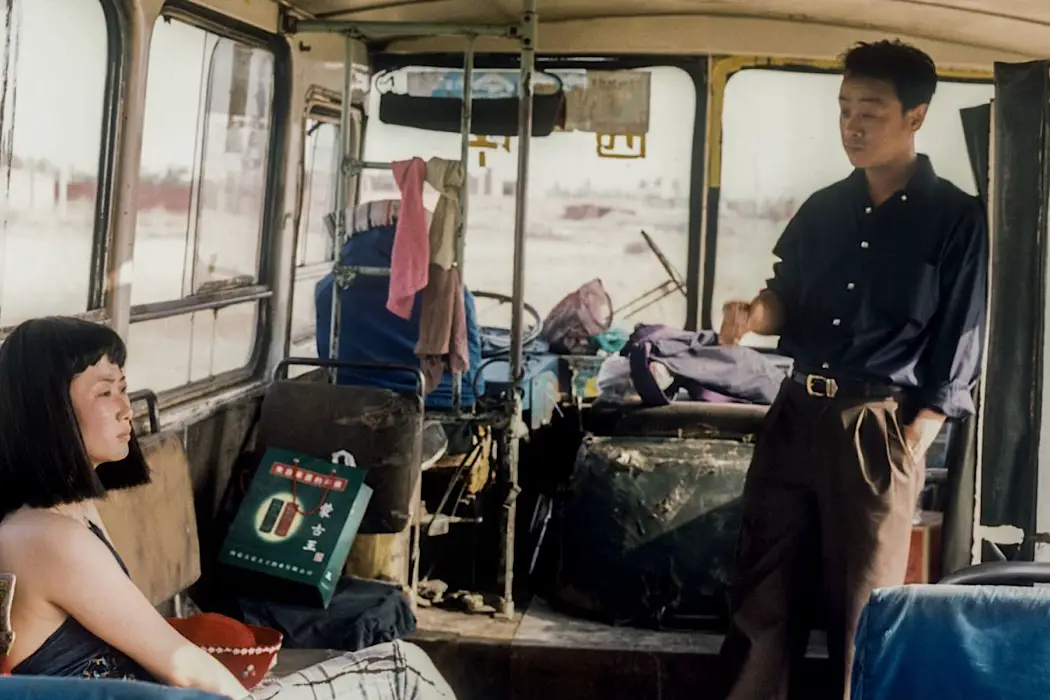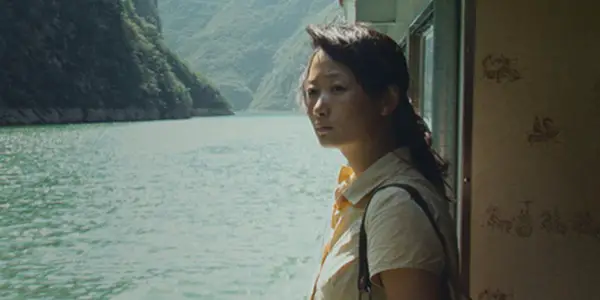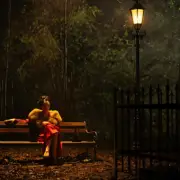CAUGHT BY THE TIDES: Sea Change

Lee Jutton has directed short films starring a killer toaster,…
It’s hard to name a country that has evolved more rapidly in the twenty-first century than China, and it’s impossible to name a filmmaker who has chronicled that evolution more perceptively than Jia Zhangke. Whether documentary (I Wish I Knew, Swimming Out Till the Sea Turns Blue) or fiction (A Touch of Sin, Mountains May Depart), Jia’s films explore how globalization and industrialization have changed life in China and how its people have navigated those changes. Amidst all this upheaval, one thing remains constant: the presence of Jia’s wife and muse, Zhao Tao, whose enigmatic beauty guides us through time and space like a beacon of light.
Jia’s latest, Caught by the Tides, feels like the culmination of all his previous attempts to convey the wear and tear wrought on people and places by the passage of time. A fascinating collage of footage and outtakes shot over the past 22 years for previous Jia films (mainly Unknown Pleasures, Still Life, and Ash Is Purest White) with brand new sequences shot in the wake of the COVID-19 pandemic, Caught by the Tides follows two star-crossed lovers as they attempt to survive and thrive (but mostly just survive) amidst the transformations taking place all around them.
Set Adrift
The story begins in the northern Chinese city of Datong in the year 2001 as Qiaoqiao (the ever-present Zhao Tao) attempts to make a living through singing, dancing, and modeling gigs, many of which take place on busy streets in broad daylight as people go about their business, filled with energy and optimism for what might be on the horizon. Her manager and boyfriend, Bin (Li Zhubin), is increasingly frustrated with their grinding way of life and decides to seek new opportunities elsewhere, telling Qiaoqiao he’ll send for her once he’s made good. When he fails to do so, Qiaoqiao sets out to find him.

As Qiaoqiao meanders across China looking for Bin, years as well as miles receding in the rearview mirror, she observes changes such as the displacement of communities on the Yangtze River, forced to make way for the Three Gorges Dam, and the increasingly prominent role of technology in society, including the robot assistant she ends up working with in a grocery store during the COVID-19 pandemic. Throughout, she remains a silent witness, allowing the audience to observe her expressions, interpret her thoughts, and imagine the effect that observing all of this change has had on her as an individual. Meanwhile, Bin embarks on one failed business initiative after another, growing older but not necessarily any wiser.
Washed Ashore
Caught by the Tides has little in the way of dialogue; after all, the main protagonist doesn’t speak throughout the film’s nearly two-hour running time. (She does sing, however, showing us that she does have a voice; she just chooses not to use it, perhaps too overwhelmed by everything she has experienced to articulate how she feels about it.) What it does have is a vibrant soundtrack, which mixes original music from composer Lim Giong with a selection of rollicking songs from Chinese rock bands that add additional texture to the landscape of the film, making Caught by the Tides almost a jukebox musical of the era.

As with pretty much every other Jia film, Caught by the Tides also functions as a love letter to Zhao Tao, with the camera lovingly tracing her evolution as a woman and an actress as it also traces the wider evolution of Chinese society since the turn of the century. A remarkably subtle and charismatic performer, Zhao embodies the resiliency necessary to survive in a world in flux; her character is an anchor ensuring that the film’s largely loose and freewheeling narrative doesn’t float off on the waves of the Yangtze. The film’s final scenes, shot during the pandemic, provide a bittersweet coda to the story, with Qiaoqiao and Bin back in Datong, both visibly aged and somewhat alienated but still making their way through life.
Jia has experimented with shooting in a variety of different formats with a variety of different cameras over the years, yet somehow all this footage feels seamlessly edited together. And while audience members largely unfamiliar with Jia’s work should still be able to appreciate the melancholy journey of Caught by the Tides, longtime Jia fans will find extra enjoyment in being able to identify which films in his oeuvre various sequences draw upon; it’s not a necessity to know that something is an unused scene from Ash is Purest White, but it is a fun bonus feature.
Conclusion
A sprawling story that feels both intimate and epic, Caught by the Tides epitomizes what makes Jia Zhangke one of our most essential contemporary filmmakers.
Caught by the Tides opens in theaters in the U.S. on May 9, 2025.
Does content like this matter to you?
Become a Member and support film journalism. Unlock access to all of Film Inquiry`s great articles. Join a community of like-minded readers who are passionate about cinema - get access to our private members Network, give back to independent filmmakers, and more.
Lee Jutton has directed short films starring a killer toaster, a killer Christmas tree, and a not-killer leopard. Her writing has appeared in publications such as Film School Rejects, Bitch: A Feminist Response to Pop Culture, Bitch Flicks, TV Fanatic, and Just Press Play. In addition to movies, she's also a big fan of soccer, BTS, and her two cats.












